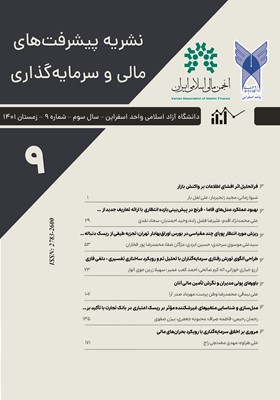مروری بر اخلاق سرمایهگذاری با رویکرد بحرانهای مالی
محورهای موضوعی : مهندسی مالی
علی هزاوه
1
,
مهدی معدنچی زاج
2
*
![]()
1 - گروه مالی، واحد علوم و تحقیقات، دانشگاه آزاد اسلامی، تهران، ایران.
2 - گروه مدیریت مالی، واحد الکترونیکی، دانشگاه آزاد اسلامی، تهران، ایران.
کلید واژه: بحران مالی, اخلاق, سرمایهگذاری, مدیران, اخلاق سرمایهگذاری,
چکیده مقاله :
هدف: هدف از این پژوهش، ایجاد الگویی از تصمیمگیری اخلاقی است که برای حسابداران و حرفه حسابداری صدق میکند. در این پژوهش الگویی یکپارچه از پنج عامل تأثیرگذار بر تصمیمگیری اخلاقی توسط حسابداران مشخص شد که عبارتند از کدهای رفتاری حرفهای، جهتگیری فلسفی، جهتگیری مذهبی، ارزشهای مشتق از فرهنگ، بلوغ اخلاقی.روششناسی پژوهش: ﻣﻄﺎﻟﻌﻪ ﺣﺎﺿﺮ ﯾﮏ ﻣﻄﺎﻟﻌﻪ ﻣﺮوری اﺳﺖ ﮐﻪ در آن از ﻣﻘﺎﻻت ﻧﻤﺎﯾﻪ ﺷﺪه در پایگاههای اﻃﻼﻋﺎﺗﯽ ﻋﻠﻤﯽ ﻧﻈﯿﺮ مرکز اطلاعات علمی جهاد دانشگاهی، مرجع دانش، پایگاه مجلات تخصصی نور و نشریه تحلیل مالی اﻧﺠﺎم ﺷﺪ. ﻣﺘﻮن ﭘﮋوﻫﺸﯽ از 1992 ﺗﺎ ﭘﺎﯾﺎن ﺳﺎل 2023 مورد بررسی قرار گرفته است. ﻣﺤﻘﻘﺎن در اﯾﻦ ﻣﻄﺎﻟﻌﻪ ﺑﺎ اﺳﺘﻔﺎده از کلیدواژههای ﺗﻌﯿﯿﻦ ﺷﺪه، ﻣﻘﺎﻻت ﻣﻌﺘﺒﺮ اﻧﮕﻠﯿﺴﯽ را از ﻣﻨﺎﺑﻊ ﻣﻌﺘﺒﺮ اﻟﮑﺘﺮوﻧﯿﮏ ﺟﺴﺘﺠﻮ و اﺳﺘﺨﺮاج ﻧﻤﻮده و ﺑﺎ ﺑﺮرﺳﯽ ﻣﺘﻮن ﮐﺎﻣﻞ اﯾﻦ ﻣﻘﺎﻻت، دادههای ﺣﺎﺻﻞ را ﺑﻪ ﺻﻮرت دﺳﺘﻪ ﺑﻨﺪی ﺷﺪه ﺗﻮﺻﯿﻒ ﻧﻤﻮدﻧﺪ.یافتهها: بر اساس یافتههای پژوهش اغلب بحرانهای مالی از پس عدم رعایت اخلاق در فرآیندهای تصمیمگیری به وجود میآیند و پیروی از اصول اخلاقی در تصمیمات و رفتار حرفهای، قادر است از حرکت جامعه به سمت بحرانهای مالی در بلندمدت جلوگیری کند.اصالت / ارزشافزوده علمی: بر اساس یافتههای پژوهش در نهایت مشخص شد الزامات اخلاقی در سرمایهگذاری نیز یکی از مقولههای الگوی اخلاق در سرمایهگذاری در بحران مالی میباشد. ساماندهی و توسعه بازار سرمایه در گروی توجـه بـه تنظـیم سـاختار بـازار مالی متناسب با ویژگیهای کلان اقتصادی و مختصات بنگاههای فعال در اقتصاد کشور است.
Purpose: The purpose of this research is to create a model of ethical decision-making that applies to accountants and the accounting profession. In this research, an integrated pattern of five factors affecting ethical decision-making by accountants was identified, which include professional codes of conduct, philosophical orientation, religious orientation, values derived from culture, and moral maturity.Research Methodology: The present study is a review study in which the articles indexed in scientific databases such as Academic Jihad Scientific Information Center, Marja Danesh, Noor specialized magazines database and financial analysis publication were made. Research texts from 1992 to the end of 2023 have been examined. In this study, the researchers searched and extracted the valid English articles from the valid electronic sources by using the determined keywords, and by examining the full texts of these articles, they described the obtained data in a classified manner.Findings: According to the findings of the research, most of the financial crises are caused by the non-observance of ethics in decision-making processes, and following ethical principles in decisions and professional behavior can prevent society from moving towards financial crises in the long term.Originality / Value: Based on the findings of the research, it was finally determined that the ethical requirements in investment is one of the categories of the model of ethics in investing in the financial crisis. The organization and development of the capital market depends on the regulation of the structure of the financial market in accordance with the macroeconomic characteristics and the coordinates of the companies active in the country's economy.
Lumberg, J. (2019). A Brief History of Impact Investing. Investopedia.
Moisson, P. H. (2020). Ethics and Impact Investment. Toulouse School of Economics.
Schnietz, K. E., & Epstein, M. J. (2005). Exploring the Financial Value of a Reputation for Corporate Social Responsibility During a Crisis. Corporate Reputation Review, 7(4), 327–345.
_||_

